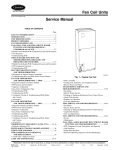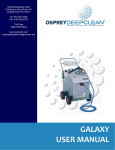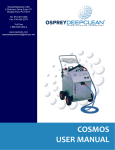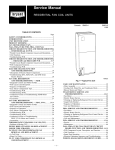Download BDP FB4A Instruction manual
Transcript
Installation Instructions Smart Heat Heat Pump Heater Packages KFCEH NOTE: Read the entire instruction manual before starting the installation. This symbol → indicates a change since last issue. SAFETY CONSIDERATIONS Installing and servicing of heating and air conditioning equipment can be hazardous due to system pressures and electrical components. Only trained personnel should install or service heating and air conditioning equipment. Untrained personnel can perform basic maintenance functions such as cleaning coils, or cleaning and replacing filters. All other operations should be performed by trained personnel. When working on heating and air conditioning equipment, observe precautions in literature, on tags, and on labels attached to the unit. Follow all safety codes. Wear safety glasses and work gloves. Have a fire extinguisher available. . Recognize safety information. This is the safety-alert symbol When you see this symbol on the unit and in instructions or manuals, be alert to the potential for personal injury. Understand the signal words DANGER, WARNING, and CAUTION. These words are used with the safety-alert symbol. DANGER identifies the most serious hazards which will result in severe personal injury or death. WARNING signifies hazards which could result in personal injury or death. CAUTION is used to identify unsafe practices, which would result in minor personal injury or product and property damage. NOTE is used to highlight suggestions which will result in enhanced installation, reliability, or operation. INTRODUCTION This instruction covers installation of Smart Heat electric heater packages Part No. KFCEH0101H10, KFCEH0201H15, and KFCEH0301H20 into FA4, FB4, FC4, and FX4 fan coils. Check unit rating plates for compatibility of fan coil and electric heater combinations. See Table 1 for heater package usage. NOTE: The Smart Heat option is for use only on heat pumps, and is not approved for any other application. Table 1—Accessory Heater Usage ELECTRIC HEATER PART NO. KFCEH0101H10 KFCEH0201H15 KFCEH0301H20 MODELS FA4, FB4, FC4, FX4 SIZE 018-036 024-048 030-070 DESCRIPTION 10 kw, Non-Fused 15 kw, Fused 20 kw, Fused DESCRIPTION AND USAGE The Smart Heat electric heater package options allow the addition of accessory heaters and related controls to models FA4, FB4, FC4, and FX4 fan coils with heat pump outdoor units only. See Table 1 for heater package usage. The Smart Heat electric heater package options enhance performance of heat pump by managing the electric heat. Heating elements are staged on individually as required to maintain dwelling set point temperature. The controller will adjust the indoor blower speed tap to reduce airflow in the ultra comfort mode. The controller is not a substitute for good installation and ductwork practices. All ductwork should be free of air leakage and insulated. Performance may not be satisfactory if good practices are not followed. NOTE: Electric heaters require a minimum airflow. See Table 2 for minimum motor speed selection before installing. There is a 1-in. minimum clearance to combustible materials for the first 36 in. of ductwork on all fan coils with 20-kw packages, and 024, 033, and 038 size fan coils with 15-kw heater packages. WARNING: Before beginning any installation or modification, be sure the main electrical disconnect switch(es) is in the OFF position. Tag the disconnect with a suitable warning label. Electrical shock can cause personal injury or death. INSTALLATION PROCEDURE 1—INSTALL ELECTRIC HEATER ASSEMBLY NOTE: Ensure heater coils are not deformed or damaged during heater installation. 1. Make sure power is off. 2. Remove blower access panel of fan coil unit. Form: AG-FCEH-07 Cancels: AG-FCEH-03 Printed in U.S.A. 5-00 Catalog No. 63FC-EH5 INSERT FUSE BOX TAB HERE COVER PLATE OR KNOCKOUT SINGLE-CIRCUIT GROUND LUG FUSE BOX TAB DIMPLE FUSE BOX DUAL-CIRCUIT GROUND LUG SLOTS HEATER/CUTOUT COVER FUSE COVER WIRE TIE (REMOVE ON LARGE FAN COILS) A94126 Fig. 1—Installation of Heater Package and Printed-Circuit Board 3. Disconnect power leads, pigtail leads (black and yellow), fan leads (yellow, red, blue, and black), primary and secondary transformer leads, and all low-voltage control wires. Remove existing printed-circuit board (PCB). Remove existing heater package or cooling control plate from fan coil. (See Fig. 1.) 4. Insert heater assembly into front of fan coil until element rods engage holes in heat shield. 5. Attach heater control plate to fan coil using 2 screws. (See Fig. 1.) Table 2—Minimum Motor Low-Speed Tap Selection FAN COIL FA4, FB4, FC4 018 024 030 033 036 038 042 048 060 070 FX4 — — 030 — 036 — 042 048 060 — 10 Med* Low Low Low Low — — — — — HEATER KW 15 — Med† Low Med† Low Low† Low Low — — 20 — — Med† Low† Low† Low† Low† Low† Low† Low† * High speed with 208v. † Requires a minimum 1-in. clearance to combustible materials for the first 36 in. of ductwork. On 2-speed fan models, low speed may be used in place of medium (Med) speed. PROCEDURE 2—ATTACH FUSE BOX For 15- and 20-kw fused heater: 1. After installing heater assembly, attach fuse assembly to side of fan coil unit by inserting fuse box tab between insulation and left side of unit and fan deck, if necessary. 2. Mount front of assembly to side flange with 2 screws provided. On fan coil units size 042 and larger, remove wire tie that shortens wire length between heater and fuses. 3. Close cover by engaging dimples in fuse box. (See Fig. 1.) PROCEDURE 3—PRINTED-CIRCUIT BOARD (PCB) AND BRACKET INSTALLATION CAUTION: Avoid direct contact with the PCB. The PCB is a static sensitive device. Handle by the sheet metal bracket only. Static discharge can damage the PCB. —2— CEPL130121-01 MOV1 FS1 Z1 C14 R39 C4 D5 R23 C6 R7 R6 Y R8 Z4 C11 R17 U1 LED1 R2 W2D W 2T Z3 R5 R40 R18 R11 U2 O R16 R19 R10 C9 C8 JW6 G R12 R20 C12 C10 R13 W3 C7 R15 D3 JW4 JW5 CLIP JUMPER FOR HIGH SPEED FAN ONLY B C K1 R14 R26 E R29 D4 E B Q1 Q2 B C E D1 C Q3 ® K2 6 DUMMY T2 9 240 VAC F1 T3 COMMON DUMMY ® HSCI FAN 240 VAC F2 JW2 (HIGH FAN ONLY WHEN CUT) AUX+ P1 8 7 LR40061 5 4 T1 3 XFORM Yo AUX– 2 R27 JW8 R4 1 D2 1 JW1 (CUT WHEN OUTDOOR THERMOSTAT IS USED) JW1 Z2 R41 JW2 R36 R37 C15 C3 R38 C2 C13 R21 R9 JW7 R22 C Z5 C5 CESS430121-01A LOW VOLTAGE TERMINAL BOARD R R3 1 R28 R25 R24 ST1 R1 R30 JW3 SEC1 RECEPTACLE CES0130025 – SEC2 HI LO K3 A94127 Fig. 2—Printed-Circuit Board (PCB) 1. Install control board assembly into slots on blower deck. (See Fig. 1.) 2. Insert screw through mounting bracket into lip of fan coil and tighten. PROCEDURE 4—ELECTRICAL CONNECTIONS Refer to unit instructions for recommended wiring procedures. Install wiring in accordance with all applicable local and national codes. See Table 3 for recommended wire and fuse sizes. Harness contains both 24-v control, and high-voltage wiring. 1. Connect heater harness plug to receptacle on PCB. (See Fig. 2.) A secure connection MUST be made between plug and receptacle. Plug will interlock with receptacle when properly seated. 2. Connect yellow common fan lead to PCB fan terminal F1. 3. Connect desired cooling speed to PCB terminal HI. 4. Connect lower speed desired for reduced heat pump speed to terminal LO. (See Tables 2, 4, and 5.) 5. Connect unused fan speed tap to dummy terminal F2. 6. For 24-v control system connections to unit PCB: Refer to unit wiring instructions and diagrams for recommended wiring procedures. (See Fig. 3, 4, 5, 6, 7 and 8.) Use 18-gage thermostat wire for low-voltage control field wiring. When over 100 ft, increase wire gage. NOTE: PCB staging is automatic and controls its own algorithm. However, if local codes require using an outdoor thermostat (see applicable outdoor unit Installation Instructions), cut jumper wire JW1 on PCB. (See Fig. 2.) All heaters are limited to 2 levels of heat with jumper JW1 cut. (See Table 6 for capacity.) CAUTION: Miswiring of transformer to printed circuit board will destroy both transformer and printed circuit board. 7. High-voltage supply connections to heater: Unit wiring label is for 230-v operation. On transformers without primary leads, use the yellow and black pigtails provided with kit. Connect yellow lead between transformer "C" and PCB "T1". Connect black lead between transformer 230 or 208 and PCB "T3". On transformers with primary leads, connect primary transformer black lead to T1, blue lead to T2, and red lead to T3. When using 208v, connect red primary lead to T2 and blue lead to T3. 8. Connect secondary transformer wires to PCB terminals SEC1 and SEC2. (See Fig. 2.) NOTE: Heater supply circuit wire size and overcurrent protection must comply with National Electric Code (NEC) and Underwriters Laboratories (UL) "Branch Circuit" requirements. (See Tables 3, 4, and 5.) Wires and overcurrent protection, integral to the heater, are not required to meet branch circuit requirements. Internal circuit protection of 60 amps maximum is acceptable. —3— Table 3—Electric Heater Package Data WATTS @ 240V: 9000 KFCEH0101H10 230-v 208-v SINGLE CIRCUIT HEATER AMPS MCA* MOP† 75°C WIRE SIZE (AWG) MAXIMUM WIRE LENGTH (FT) 35.9 48.3 50 8 32.5 44.0 45 8 61 60 KFCEH0201H15 230v WATTS @ 240v: 15,000 208v SINGLE CIRCUIT HEATER AMPS MCA MOP 75°C WIRE SIZE (AWG) MAXIMUM WIRE LENGTH (FT) 59.9 80.3 90 4 54.2 73.2 80 4 92 92 DUAL CIRCUIT WATTS @ 240v: 11,000 L1/L2 HEATER AMPS MCA MOP 75°C WIRE SIZE (AWG) MAXIMUM WIRE LENGTH (FT) L3/L4 HEATER AMPS MCA MOP 75°C WIRE SIZE (AWG) MAXIMUM WIRE LENGTH (FT) 43.9 54.9 60 6 39.7 49.7 50 8 85 53 WATTS @ 240v: 4000 16.0 25.4 30 10 14.4 23.4 25 10 74 73 WATTS @ 240v: 20,000 KFCEH0301H20 230v 208v SINGLE CIRCUIT HEATER AMPS MCA MOP 75°C WIRE SIZE (AWG) MAXIMUM WIRE LENGTH (FT) 79.9 106.7 110 2 72.3 97.2 100 3 111 87 DUAL CIRCUIT WATTS @ 240v: 10,000 L1/L2 HEATER AMPS MCA MOP 75°C WIRE SIZE (AWG) MAXIMUM WIRE LENGTH (FT) L3/L4 HEATER AMPS MCA MOP 75°C WIRE SIZE (AWG) MAXIMUM WIRE LENGTH (FT) 40.0 56.8 60 6 36.2 52.0 60 6 82 81 WATTS @ 240v: 10,000 *MCA — Minimum Circuit Ampacity †MOP — Maximum Overcurrent Protection —4— 40.0 50.0 50 8 36.2 45.3 50 8 93 93 TYPICAL HEAT PUMP THERMOSTAT INDOOR CONTROL BOARD OUTDOOR SPLICE R R R C C C Y Y G G O O O E W2D W2 W2 W2T L W3 SINGLE-SPEED HEAT PUMP DEFROST BOARD JW1 Y0 Y L A94128 Fig. 3—System Wiring Diagram Using A Typical Indoor Thermostat, With No Outdoor Thermostat a. Nonprotected heaters (1.) The 10-kw heater can be wired for single supply only. Supply circuits connect to heater pigtail leads. (2.) The 10-kw heaters can use separate field-installed, factory-authorized disconnect kit Part No. KFADK0101DSC which installs in fan coil. b. Fused heater (1.) The 15- and 20-kw heaters can be wired for single- or dual-supply circuits. (2.) Single supply circuit wiring requires a factory-authorized, single point adapter kit Part No. KFASP0101SPK. Table 4—Color Code For Motor Lead Wires MOTOR SPEED TAP WIRE COLOR Common Yellow High Black Medium Blue (3-speed only) Low Red (Blue — 2-speed motors) Table 5—Fan Motor Speed Taps UNIT MOTOR SPEED FA4A018-036 2 COOL SPEED High FA4A042-070 3 Medium FB4A, FC4B, FX4A (All Sizes) 3 Medium 9. Ground Connections → WARNING: According to NEC, ANSI/NFPA 70, and local codes, the cabinet must have an uninterrupted or unbroken ground to minimize personal injury if an electrical fault should occur. The ground may consist of electrical wire or metal conduit when installed in accordance with existing electrical codes. (See Ground/Conduit Note below.) Failure to follow this warning could result in electrical shock, fire, or death. NOTE: Use UL-listed conduit and conduit connector for connecting supply wire(s) to unit to obtain proper grounding. If conduit connection uses reducing washers, a separate ground wire must be used. Grounding may also be accomplished by using grounding lugs provided in control box. a. For non-protected or single-circuit heaters, 1 equipment ground connection is provided on fan coil units. (See Fig. 1.) —5— INDOOR CONTROL BOARD MODEL HP THERMOSTAT OUTDOOR SPLICE 24 VAC HOT R R R 24 VAC COMM C C C COOL / HEAT STAGE 1 Y/Y2 Y FAN G G RVS COOLING O/W2 O O W2D W2 HEAT STAGE 2 W/W1 W2T SINGLE-SPEED HEAT PUMP DEFROST BOARD JW1 W3 Y0 Y A97217 Fig. 4—System Wiring Diagram Using A Corporate Model Heat Pump Indoor Thermostat, With No Outdoor Thermostat b. For 15- and 20-kw fused heaters, an additional ground lug is provided on fuse mounting bracket for dual-circuit grounding. (See Fig. 1.) 10. Mode Selection a. In some cases it is desirable for the PCB to operate in efficiency mode. This is accomplished by cutting jumper JW2. (See Fig. 2.) Jumper JW2 is labeled. Cut jumper for high speed fan only. In this mode, the PCB only energizes the HI speed tap selection. With jumper JW2 cut, fan speed tap terminal LO becomes a dummy terminal. b. In some instances when fan coil heater calls for a minimum speed selection of MED (blue) and desired cooling speed is MED (blue), fan speed tap MED (blue) should be located on PCB fan terminal labeled HI, and JW2 jumper must be cut. Store unused fan taps on terminals DUMMY and LO. c. When 018 size fan coil unit is used on 208v, black speed tap must be connected to HI and JW2 must be cut. 11. Accessories Use accessory kit Part No. KFAIR0101ACR to attach electronic air cleaner (EAC) or humidifier. (See Fig. 9.) Follow accessory kit Installation Instructions. PROCEDURE 5—ATTACH WIRING DIAGRAM AND RATING LABEL 1. Attach new wiring label to fan coil blower. Completely cover old wiring label. (See Fig. 12.) 2. Attach new heater rating label over existing electrical information rating label located on front access door of fan coil unit. (See Fig. 10.) PROCEDURE 6—INSTALLATION VERIFICATION 1. After completion of heater installation, check to ensure proper connections and routings have been made. 2. Ensure all electrical covers are in place, and proper labels have been applied. 3. Reinstall blower access door before turning on unit power. PROCEDURE 7—SMART HEAT OPERATION A. Cooling Smart Heat option controls the cooling mode in the same manner as conventional heat pumps are controlled. The fan has a 90 sec blower off delay at the end of a cooling cycle. B. Heat Pump Heating Smart Heat option does not control heating in the conventional method. The PCB energizes the compressor 30 sec before the indoor fan is energized. This allows the indoor coil to heat up eliminating cold-blow on start-up. The electric heat is staged-on to allow continuous operation of heat pump and electric resistance heat below the balance point (below the point where the heat pump cannot maintain dwelling temperature without supplemental heat) independent of outdoor thermostats. Although the PCB has provisions for an outdoor thermostat, it is not needed for staging. On cycle down, indoor fan remains on 60 sec to recover heat stored in indoor coil. —6— TYPICAL HEAT PUMP THERMOSTAT INDOOR CONTROL BOARD OUTDOOR SPLICE R R R C C C Y Y G G O O O E W2D W2 W2 W2T L W3 SINGLE-SPEED HEAT PUMP DEFROST BOARD CUT JW1 Y0 ODT Y L A94129 Fig. 5—System Wiring Diagram Using A Typical Indoor Heat Pump Thermostat, With 1 Outdoor Thermostat MODEL HP THERMOSTAT INDOOR CONTROL BOARD OUTDOOR SPLICE 24 VAC HOT R R R 24 VAC COMM C C C COOL / HEAT STAGE 1 Y/Y2 Y FAN G G RVS COOLING O/W2 O O W2D W2 HEAT STAGE 2 W/W1 W2T CUT JW1 SINGLE-SPEED HEAT PUMP DEFROST BOARD ODT W3 Y0 Y A97218 Fig. 6—System Wiring Diagram Using A Corporate Model Heat Pump Indoor Thermostat, With 1 Outdoor Thermostat C. Defrost The Smart Heat PCB stages the correct amount of supplemental heat during defrost. If too much heat is added, the system will stay in defrost for the completion of the defrost cycle even though the thermostat is satisfied. On the next cycle, 1 less element will be energized during the next defrost period. D. Diagnostic LED The PCB of the Smart Heat option heater package contains a microprocessor which controls fan operation, fan speed, outdoor unit, and heater elements. For troubleshooting, a service LED indicates the condition of the PCB. See Table 7 for LED flash codes. —7— TYPICAL HEAT PUMP THERMOSTAT INDOOR CONTROL BOARD OUTDOOR SPLICE R R R C C C Y Y G G O O O W2D W2 E SHR W2 W2T L W3 CUT JW1 Y0 SINGLE-SPEED HEAT PUMP DEFROST BOARD SHR ODT Y L A94130 Fig. 7—System Wiring Diagram Using A Typical Indoor Heat Pump Thermostat, With Supplemental Heat Relay MODEL HP THERMOSTAT INDOOR CONTROL BOARD 24 VAC HOT R 24 VAC COMM C OUTDOOR SPLICE R R C C SINGLE-SPEED HEAT PUMP DEFROST BOARD SHR COOL / HEAT STAGE 1 Y/Y2 Y FAN G G RVS COOLING O/W2 O O W2D W2 HEAT STAGE 2 W/W1 W2T CUT JW1 SHR ODT W3 Y0 Y A97219 Fig. 8—System Wiring Diagram Using A Corporate Model Heat Pump Indoor Thermostat, With Supplemental Heat Relay PROCEDURE 8—OPERATING AND INSTALLING CHARACTERISTICS A. PCB Component Layout, Description, and Function 1. Low-voltage terminal board is used to connect indoor thermostat to 24-v secondary side of transformer, and to serve as a junction between indoor thermostat and outdoor unit. (See Fig. 2.) a. R is used to connect secondary side of transformer to thermostat and outdoor unit. R is fused. b. C is used to connect transformer secondary common for thermostat and outdoor unit. c. Y is input signal from thermostat signaling heat pump operation. d. G is input signal from thermostat, signaling continuous fan operation. e. O is input and junction terminal for reversing valve signal. f. W2D is input from outdoor unit (heat pump), signaling control board that heat pump is in defrost. —8— Table 6—Electric Heater Stage Limiting STAGES (KW OPERATING) HEATER PART NO. W2T Only (JW1 cut) W2T and W3 Heater Stage 1 2 3 4 KFCEH0101H10 10 kw Non-Fused 3 6 9 9 KFCEH0201H15 15 kw Fused 3 8 11 15 KFCEH0301H20 20 kw Fused 5 10 15 20 Table 7—LED Flash Code FLASH CONDITION NO LIGHT/FLASH STEADY LIGHT STEADY FLASH 1 FLASH 2 FLASHES 3 FLASHES 4 FLASHES 5 FLASHES 6 FLASHES 7 FLASHES INPUT SIGNAL — — — Y only Y and/or W2T Y and/or W2T Y and/or W2T Y, O Y, W2D, and/or W2T W2T PROBLEM INDICATION No Power or Board Failure Board Failure Stand By Condition or Fan Only Heat Pump Only Operating Heat Pump Plus 1 Relay Heat Pump Plus 2 Relays Heat Pump Plus 3 Relays Cool Mode Defrost Mode Emergency Heat Mode g. W2T is input from thermostat signaling for supplemental or emergency heat. h. W3 is input from outdoor thermostat. JW1 connects W3 to W2T as wired at factory. This input is used only if an outdoor thermostat is required by local codes. i. Y0 is output from control board to energize outdoor unit (heat pump) contactor. 2. Jumper wires (JW1 and JW2) a. JW1 connects W2T to W3 to limit staging of electric heat with use of an outdoor thermostat. See Table 6 for staging. PCB controls staging to extent that this feature is unnecessary unless required by local codes or regulations. b. Cutting JW2 sets the PCB in efficiency mode. With JW2 cut, there is no loss of performance due to reduced indoor blower speed when heat pump is operating near balance point. This jumper may be required to be cut if selected cooling fan speed is same as required minimum motor LO speed tap selection as listed in Table 2. With JW2 cut, fan terminal LO becomes a dummy terminal. 3. A fuse is used to protect low-voltage transformer and PCB. 4. AUX+ and AUX- are connections for air conditioning accessories (EAC, humidifier, etc.). 5. F1, F2, HI, and LO are connections for indoor fan. 6. The 9-pin receptacle connects heater package wiring harness. 7. SEC1 and SEC2 are used to connect secondary side of transformer to PCB. SEC1 is connected to equipment ground. B. Transformer The proper wiring of the transformer on the PCB is illustrated in Fig. 11. NOTE: Terminals T1, T2 (if used), and T3 are wired to primary or high side of transformer. The 208-v terminal (or blue wire if the transformer has primary leads) is used on T3 for 208-v applications. The 230-v terminal (or red wire) is used on T3 for 230-v applications. The T2 is a dummy terminal. C. Electric Heat 1. When thermostat calls for electric heat, 24-v signal is sent to PCB through W2T. PCB will energize first stage of electric heat. 2. First 2 stages will come on if W2T and Y are energized at same time. After each 10 minutes W2T is energized, another stage of electric heat will energize. 3. As W2T is de-energized, electric heat will stage down in 8 minute steps with exception of first step. First step will be on only half as long as it was prior to W2T de-energizing. 4. When W2T is energized by itself, JW1 is cut, and an outdoor thermostat is used and is open. Staging is limited as listed in Table 6. 5. When both W3 and W2T are energized without JW1 being cut, or with outdoor thermostat closed, system operation will stage heat up to maximum level if signal is energized for proper amount of time. 6. If only W3 is energized, there is no effect on the PCB. No heat will be energized. D. Accessories Terminals AUX+ and AUX- are energized with 24vdc when fan is energized. The accessory kit Part No. KFAIR0101ACR is used to connect an EAC or humidifier. NOTE: Loads cannot be connected directly to AUX+ and AUX-. Use the specified kit only. —9— WHT BLK GRN 24 VDC RELAY BLK 230 VAC OR 115 VAC BRANCH CKT FOR EAC 24 VAC LOW VOLTAGE CKT FOR HUMIDIFIER GND HOT NEUT PCB AUX+ AUX– WHT BLK TO EAC OR HUMIDIFIER A00109 Fig. 9—Wiring Layout of KFAIR0101ACR UNIT RATING LABEL ON DOOR HEATER LABEL FROM KIT A90111 Fig. 10—Heater Rating Label Location on Fan Coil Rating Plate —10— INTERNAL FUNCTION 24V TRANS 208 230 DUMMY TERMINALS SEC2 3 2 1 6 5 4 9 8 7 CAP SEC1 T1 T2 T3 9-PIN RECEPTACLE TO HEATER PACKAGE PROCESSOR F1 F2 K3 HI LO FAN MOTOR JW1 LOW VOLTAGE TERMINAL BOARD CLIP JUMPER FOR HIGH SPEED OPERATION ONLY R AUX– AUX+ JW2 C K1 Y G O W2D W2T W3 Y0 K2 FUSE LEGEND INTERNAL CONDUCTORS EXTERNAL WIRES Fig. 11—PCB Schematic —11— A94149 CAUTION: THIS COMPARTMENT MUST BE CLOSED EXCEPT FOR SERVICING NOT SUITABLE FOR USE ON SYSTEMS EXCEEDING 150V TO GROUND BLOWER MOTOR ROTATION ATTENTION: NE CONVIENT PAS AUX INSTALLATIONS DE PLUS DE 150 V A LA TERRE SCHEMATIC DIAGRAM COMPONENT ARRANGEMENT DISCONNECT PER NEC BLK BLK RELAY 2 BLK RELAY 2 RELAY 3 BLK 4 2 YEL ORG YEL BRN BLK 3 DUMMY T2 4 8 7 BRN COM HI MED BRN T3 BRN Yo LVTB W3 W2T RED TRAN BRN SEE NOTE #3 GRN/YEL GND 8 4 208 V 0 1 RELAY 2 6 2 8 4 L4 FU4 60A 0 1 L2 FU2 60A RELAY 1 F1 HI F2 LO 6 HPLV LEADS RED-LOW BLU-MED BLK-HI GRN/YEL-GND GND L1 FU1 60A 2 L3 FU3 60A 8 4 0 1 FM BRN BRN YEL-COM CAP FAN MOTOR THERMALLY PROTECTED O LED FLASH CODES R C Y G O NO LIGHT OR FLASH C E W2 STEADY LIGHT INDOOR THERMOSTAT SEE NOTES #2, #7,AND #8 LO LEGEND NOTES: 1. 2. 3. 4. 5. 2 GND Y R FM 6 T2 W2 CAP 24 V BRN 230 V AUX + T1 JW1 O Y G C YEL R BLK 5 9 COM 208V 230V RED BLK AUX - RED YEL BLU 3 2 1 6 5 4 9 8 7 RELAY 1 6 R C Y G O W2D W2T W3 Yo SEC 2 F SEC 2 YEL LO F2 240 VAC T3 1 2 W2D HI FAN 240 DUMMY VAC SEC 1 COMM PCB PCB SEC 1 F LED RELAY 2 VIO XFORM T1 F1 RED RELAY 3 8 6 HTR1 BLK LS1 COM JW2 JW1 HTR2 LS2 LS2 LS3/4 SYSTEM TRANSFORMER: 40.0VA FAN COIL/HEATER: 26.3VA REMAINING VA AVAILABLE: 13.7VA BRN YEL YEL HTR4 BLK 3 LS1 HTR2 TRAN BLK HTR3 BLK RELAY 1 YEL LS3 2 4 2 4 LS4 1 L2 HTR3 HTR4 RELAY 3 2 4 YEL L4 FU2 FU3 GND BLK L3 HTR1 SEE RATING PLATE FOR VOLTS & HERTZ SEE NOTE #1 FU4 L1 FU1 FIELD POWER WIRING Use copper wire (75°C min) only between disconnect switch and unit. Connect low voltage wiring as shown (24VAC). Connect transformer primary to the proper voltage terminal To be wired in accordance with N.E.C. and local codes. If any of the original wire, as supplied, must be replaced, use the same or equivalent type wire. 6. Replace low voltage fuse with no greater than 5 amp fuse. 7. Refer to thermostat instructions for "E" jumper installation. 8. Do NOT connect thermostat "E" to PCB "W3". CAP COMM F FW GND HPLV HTR LS MINIMUM MOTOR LO SPEED TAP SELECTION 030 033 036 038 042 048 060 070 FAN COIL SIZE MOTOR SPEED AT 20 KW MED MED LO LO LO LO LO LO CAPACITOR COMMON LOW VOLT FUSE FAN MOTOR EQUIPMENT GROUND HEAT PUMP LOW VOLT HEATER LIMIT SWITCH LED LVTB TRAN XFORM STEADY FLASH 1 FLASH DIAGNOSTIC LIGHT LOW VOLT TERM BRD 2 FLASHES TRANSFORMER 3 FLASHES PCB TRAN TERMINALS FIELD HIGH VOLTAGE 4 FLASHES FIELD LOW VOLTAGE 5 FLASHES HPLV LEADS MARKED TERMINAL 324991-101 REV. A 6 FLASHES PCB JUMPER (JW) UNMARKED TERMINAL 7 FLASHES NO POWER OR BOARD FAILURE BOARD FAILURE STAND BY CONDITION OR FAN ONLY HEAT PUMP HEAT ONLY OPERATING HEAT PUMP PLUS 1 RELAY HEAT PUMP PLUS 2 RELAYS HEAT PUMP PLUS 3 RELAYS COOL MODE DEFROST MODE EMERGENCY HEAT MODE USE THIS LABEL ON PRODUCTS WITH NEW CONTROLS. SEE INSTRUCTION FOR DESCRIPTIONS. A00098 → Fig. 12—Typical 20kw Wiring Label © 2000 CAC/BDP P.O. Box 70, Indianapolis, IN 46206 agfceh07 —12— Book/Tab: 1/3c, 4/2c Catalog No. 63FC-EH5






















